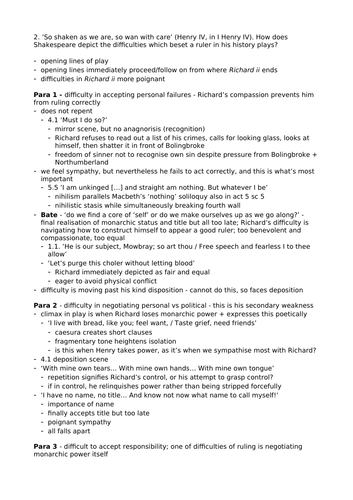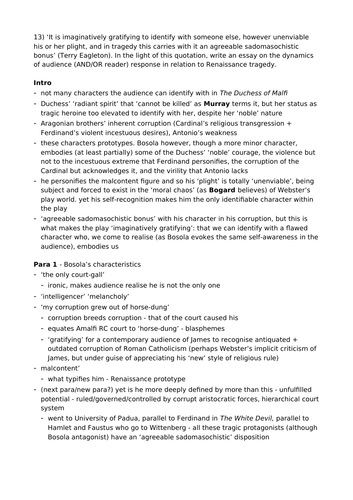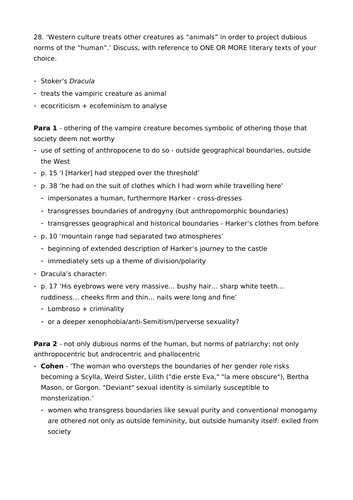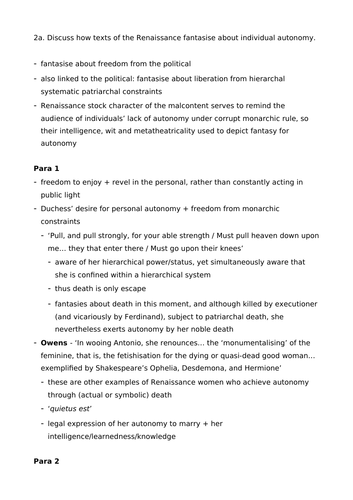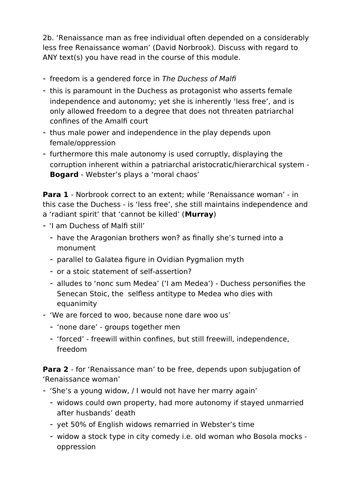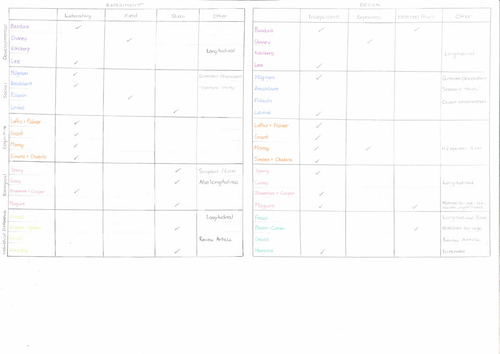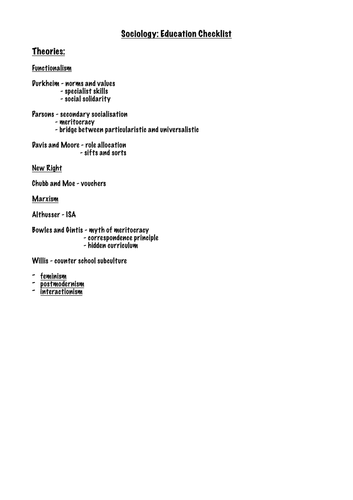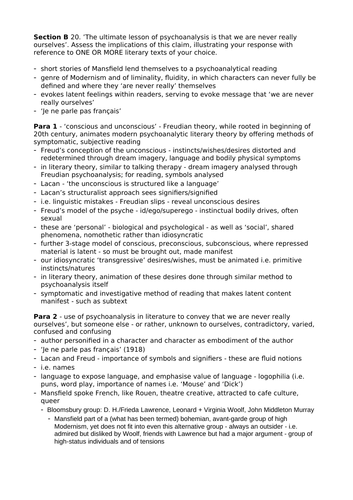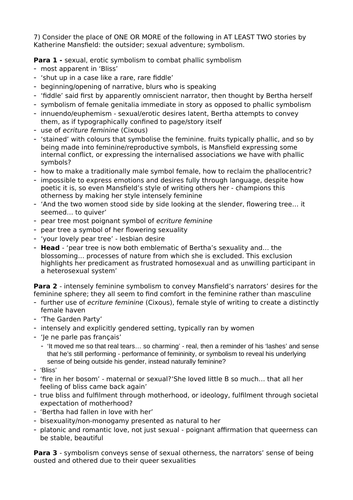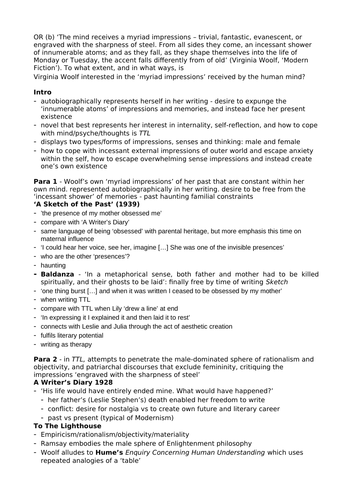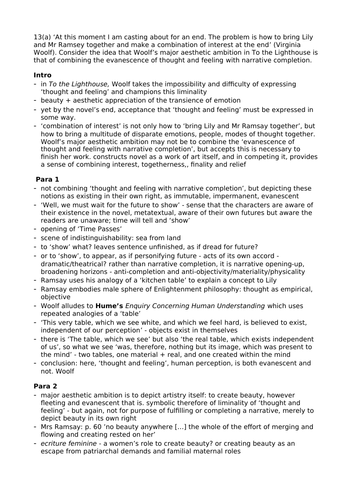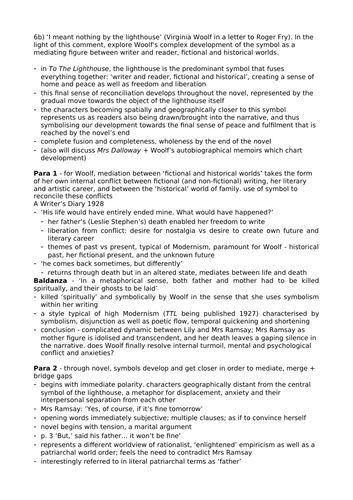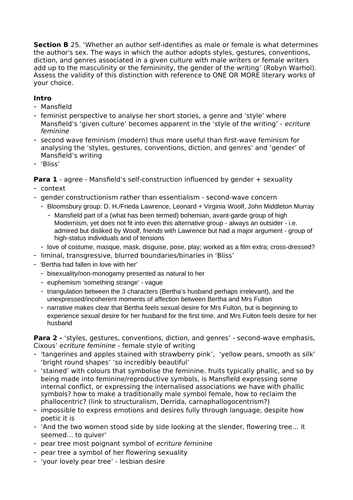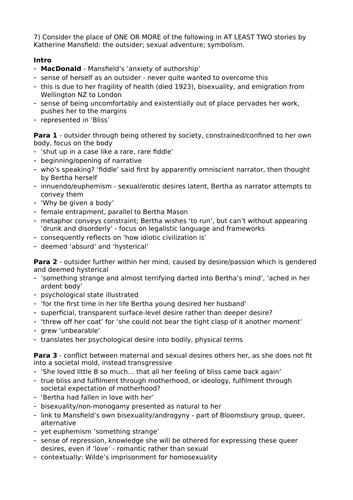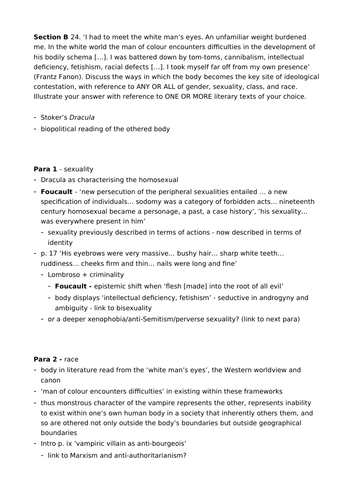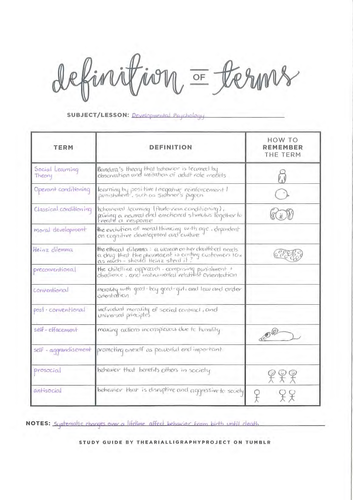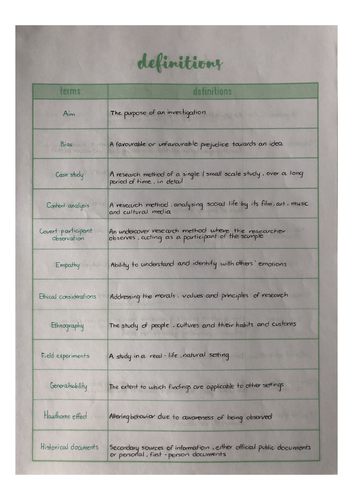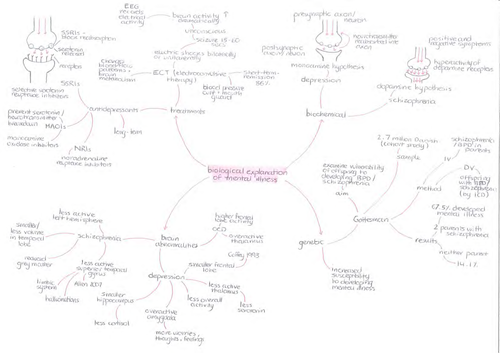
89Uploads
21k+Views
1k+Downloads
All resources

Essay Plan: Richard ii & Rulership
This essay plan on Shakespeare’s history play, Richard ii, answers the question: ’So shaken as we are, so wan with care’ (Henry IV, in I Henry IV). How does Shakespeare depict the difficulties which beset a ruler in his history plays?
It deals with the character of Richard ii and his compassion, his difficulty in distinguishing between personal and political boundaries, and the difficulty he faces in accepting monarchic responsibility.
Written by a second-year undergraduate at Durham University.

Essay Plan: The Duchess of Malfi - Identification
Essay plan on John Webster’s The Duchess of Malfi on the theme of audience identification.
It answers the question:
‘It is imaginatively gratifying to identify with someone else, however unenviable his or her plight, and in tragedy this carries with it an agreeable sadomasochistic bonus’ (Terry Eagleton). In the light of this quotation, write an essay on the dynamics of audience (AND/OR reader) response in relation to Renaissance tragedy.
The plan deals primarily with the character of Bosola. It argues that his character’s anti-authoritarian and transgressive characteristics allow the audience to identify with his character.
Written by a finalist at Durham University. Excellent resource for A-level and university students.

Essay Plan: Dracula & Eco-criticism
Essay plan on Bram Stoker’s novel Dracula through an ecocritical and ecofeminist lens.
It answers the question:
‘Western culture treats other creatures as “animals” in order to project dubious norms of the “human”.’ Discuss, with reference to ONE OR MORE literary texts of your choice.
The essay plan discusses the role of the anthropocene in othering the figure of the vampire, as role as gender ambiguity and androgyny. It also discusses the animalisation of Dracula’s character being rooted in anti-Semitism.
Includes critical quotations, analysis of quotations within the novel, and multiple interpretations. Excellent resource for A-level and university students.
Written by a second-year undergraduate at Durham University.

Essay Plan: The Duchess of Malfi & Autonomy
An essay plan on John Webster’s The Duchess of Malfi on the theme of individual autonomy.
It answers the question: Discuss how texts of the Renaissance fantasise about individual autonomy.
The plan discusses freedom in regards to women during the Jacobean era, as well as male autonomy, corruption, patriarchy, power and independence vs oppression, etc. Engages with critical quotations and analyses language within the play.
Excellent resource for university and A-level students. Written by a Durham University second-year student.

Essay Plan: The Duchess of Malfi & Freedom
An essay plan on John Webster’s The Duchess of Malfi on the theme of freedom.
It answers the question:
‘Renaissance man as free individual often depended on a considerably less free Renaissance woman’ (David Norbrook). Discuss with regard to ANY text(s) you have read in the course of this module.
The plan discusses freedom in regards to women during the Jacobean era, as well as male autonomy, corruption, patriarchy, power and independence vs oppression, etc. Engages in a dialogue with the critical quotation in the question.
Excellent resource for university and A-level students. Written by a Durham University second-year student.

A* A-level English Streetcar/Malfi Comparison
A* / near full mark essay for English literature comparing ‘A Streetcar Named Desire’ (Williams) and ‘The Duchess of Malfi’ (Webster).
On men and women/gender power struggles which is a central theme needed for any essay for Eduqas/WJEC!
Can also be used for AQA/OCR/Edexcel/CCEA/CIE.

A-level Psychology Core Studies summary
Simple, well laid out summary table of each core study design and experiment type for the OCR spec. Can be used for AQA/Edexcel/CIE/WJEC/Eduqas also.
For the core studies exam but also needed if questions asked for research methods.
Great for easy revision!

A-level Sociology Education Checklist
Concise summary checklist of all topics for the paper 1 AQA education topic of sociology. Can also be used for OCR/Eduqas/WJEC.
Includes: theories, social policy, gender, ethnicity, and class (all internal/external factors) with key and 1-4 sociologists for each main point.
Easy to memorise and make notes/build on for revision!

Essay Plan: Katherine Mansfield and Psychoanalysis
This essay plan was written by a second-year undergraduate at Durham University.
It looks at the question: ’The ultimate lesson of psychoanalysis is that we are never really ourselves’. Assess the implications of this claim, illustrating your response with reference to ONE OR MORE literary texts of your choice.
This analyses Katherine Mansfield’s short story, 'Je ne parle pas français’, using Lacanian and Freudian 20th-century models of psychoanalysis, during the Modernist era.
Can be used for university as well as A-level students.

Essay Plan: Katherine Mansfield and Symbolism
This essay plan was written by a second-year undergraduate at Durham University.
It looks at the question: Consider the place of ONE OR MORE of the following in AT LEAST TWO stories by Katherine Mansfield: the outsider; sexual adventure; symbolism.
This analyses symbolism within Katherine Mansfield’s short stories, ‘Bliss’, ‘Je ne parle pas francais’, and ‘The Garden Party’. Feminine, sexual, and erotic symbolism, and Helene Cixous’ theory of ecriture feminine is looked at.
Can be used for university as well as A-level students.

Essay Plan: Impressions in Virginia Woolf's writing
This resource is a plan written by a second-year undergraduate at Durham University.
It looks at the question: ‘The mind receives a myriad impressions – trivial, fantastic, evanescent, or engraved with the sharpness of steel. From all sides they come, an incessant shower of innumerable atoms; and as they fall, as they shape themselves into the life of Monday or Tuesday, the accent falls differently from of old’ (Virginia Woolf, ‘Modern Fiction’). To what extent, and in what ways, is Virginia Woolf interested in the ‘myriad impressions’ received by the human mind?
This can be used as a starting point to research themes of objectivity, family life, femininity, and symbolism within Virginia Woolf’s various works.

Essay Plan: Feeling in Virginia Woolf's writing
This resource is a plan written by a second-year undergraduate at Durham University.
It looks at the question: ‘At this moment I am casting about for an end. The problem is how to bring Lily and Mr Ramsey together and make a combination of interest at the end’ (Virginia Woolf). Consider the idea that Woolf’s major aesthetic ambition in To the Lighthouse is that of combining the evanescence of thought and feeling with narrative completion.
This can be used as a starting point to research themes of artistry, objectivity, imagery and symbolism within Virginia Woolf’s various works.

Essay Plan: Virginia Woolf and Symbolism
This essay plan was created by a second-year English Literature undergraduate at Durham University.
It looks at the question: ‘I meant nothing by the lighthouse’ (Virginia Woolf in a letter to Roger Fry). In the light of this comment, explore Woolf’s complex development of the symbol as a mediating figure between writer and reader, fictional and historical worlds.
This analyses Woolf’s works, A Sketch of the Past, Mrs Dalloway, To the Lighthouse, and ‘A Writer’s Diary’.

Essay Plan: Gender in Katherine Mansfield's 'Bliss'
This essay plan was created by a second-year English Literature undergraduate at Durham University.
It looks at the question: ‘Whether an author self-identifies as male or female is what determines the author’s sex. The ways in which the author adopts styles, gestures, conventions, diction, and genres associated in a given culture with male writers or female writers add up to the masculinity or the femininity, the gender of the writing’ (Robyn Warhol). Assess the validity of this distinction with reference to ONE OR MORE literary works of your choice.
This analyses Mansfield’s place within the Bloomsbury Group, Helene Cixous’ theory of ecriture feminine, feminism, and the Modernist era, and her short story, ‘Bliss’.

Essay Plan: Katherine Mansfield and the Outsider
This essay plan was created by a second-year English Literature undergraduate at Durham University.
It looks at the question: Consider the place of ONE OR MORE of the following in AT LEAST TWO stories by Katherine Mansfield: the outsider; sexual adventure; symbolism.
This analyses the idea of the outsider in Mansfield’s short story, ‘Bliss’, and themes and symbolism of gender, femininity, and the body and psyche.

Essay Plan: Dracula & Biopolitics
This essay plan interprets Bram Stoker’s novel Dracula through a biopolitical lens.
It answers the question:
‘I had to meet the white man’s eyes. An unfamiliar weight burdened me. In the white world the man of colour encounters difficulties in the development of his bodily schema […]. I was battered down by tom-toms, cannibalism, intellectual deficiency, fetishism, racial defects […]. I took myself far off from my own presence’ (Frantz Fanon).
Discuss the ways in which the body becomes the key site of ideological contestation, with reference to ANY OR ALL of gender, sexuality, class, and race. Illustrate your answer with reference to ONE OR MORE literary texts of your choice.
It discusses sexuality and homosexuality using Foucault’s The History of Sexuality. It also discusses the role of racial prejudice in writing Dracula’s character, as well as androgyny, Marxism, anti-Semitism, and xenophobia during the fin-de-siecle. Lastly, it discusses class, again linking this to wider historical context and other literary works that depict the ‘other’.
Excellent resource for A-level and university students. Written by a finalist at Durham University.

OCR Core studies A* key terms
A* summary of key terms for biological, developmental, cognitive and social psychology areas.
Includes assumptions of each area, memorable pictures and definitions for each term.
For OCR H167/G567 specification but can be used for AQA/Edexcel/Eduqas etc.

A-level Sociology/Psychology Methods Keywords
Concise summary tables of all research methods key terms for AQA A-level/AS sociology. Can also be used for OCR/Eduqas/WJEC/Edexcel and psychology.
Great for revision and self-testing!

A* Hamlet mindmap bundle
3 A* in-depth mindmaps comprising quotes, critics, and context, all independent research. For university, A-level, GCSE students, and teaching resources.
Quotes are grouped by themes: religion, madness, revenge, language, mortality, and the supernatural. Context is grouped into: Hellenistic philosophy, the ghost, Calvinism, Reformation Protestantism vs Catholicism, and genres. Critics are specific to Hamlet and Elizabethan drama.
For OCR/AQA/WJEC/CIE/CCEA/Edexcel. I’m also selling the same format resources for many other texts on my page!

A* Psychology Mental Health mindmaps
Concise but detailed summary notes on psychology (a-level or A2) for the options OCR H567 specification, but can be used for any AQA / EdExcel / WJEC Eduqas.
3 mindmaps by an A* student on the medical model, biological explanations, cognitive, humanistic alternatives and the history of mental health.

